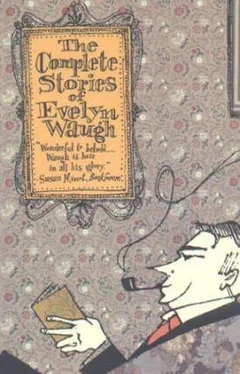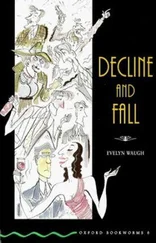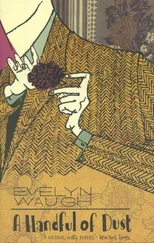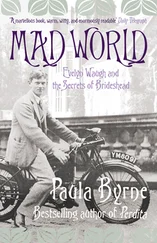
The Complete Stories of Evelyn Waugh
Evelyn Waugh
EVELYN WAUGH wrote short fiction throughout his life. His literary career—which gained critical momentum in 1928, when his first book, a biography of Dante Gabriel Rossetti, and his first novel, Decline and Fall, were both published—actually commenced in 1926, with the publication of Waugh's first post-Oxford story.
Through the decades that followed, as Waugh produced sixteen novels and nearly a dozen nonfiction works, he continued to write short fiction. Most of his stories appeared originally in periodicals ranging from Harper's Bazaar to The Atlantic and Good Housekeeping. The stories were subsequently published in book form in Waugh's lifetime in such collections as Mr. Loveday's Little Outing and Other Sad Stories, Tactical Exercise, and Basil Seal Rides Again; an additional volume, Charles Ryder's Schooldays, was published posthumously.
The Complete Stories of Evelyn Waugh, which makes all of Waugh's short fiction available to American readers for the first time, is adapted from a scholarly edition compiled by Ann Pasternak Slater and published in Great Britain by the Everyman's Library. Following is bibliographical information regarding the initial publication of each of Evelyn Waugh s stories.
"The Balance: A Yarn of the Good Old Days of Broad Trousers and High Necked Jumpers," Georgian Stories 1 926, ed. Alec Waugh, Chapman & Hall, London, 1926.
"A House of Gentlefolks," introduced as "The Tutor's Tale" in The New Decameron: The Fifth Day, ed Hugh Chesterman, Basil Blackwell, Oxford, 1927.
"The Manager of 'The Kremlin, " for a series of "Real Life Stories—by Famous Authors," John Bull, 15 February 1930.
"Love in the Slump," first published as "The Patriotic Honeymoon," Harper's Bazaar, London, January 1932.
"Too Much Tolerance," no. 7 in a series of "The Seven Deadly Sins of To-Day," John Bull, 21 May 1932.
"Excursion in Reality," first published as "An Entirely New Angle," Harper's Bazaar, New York, July 1932, and as "This Quota Stuff: Positive Proof That the British Can Make Good Films," Harper's Bazaar, London, August 1932.
"Incident in Azania," Windsor Magazine, December 1933.
"Bella Fleace Gave a Party," Harper's Bazaar, London, December 1932, and Harper's Bazaar, New York, March 1933.
"Cruise," Harper's Bazaar, London, February 1933.
"The Man Who Liked Dickens," Hearst's International combined with Cosmopolitan, September 1933, and Nosh's Pall Mall Magazine, November 1933.
"Out of Depth," subtitled "An Experiment Begun in Shaftesbury Avenue and Ended in Time," Harper's Bazaar, London, December 1933.
"By Special Request," first published with the subtitle "Chapter Five, The Next Winter," as the fifth and last episode in A Flat in London (serial version of A Handful of Dust ), Harper's Bazaar, New York, October 1934, and Harper's Bazaar, London, October 1934.
"Period Piece," Mr. Loveday's Little Outing, and Other Sad Stories, Chapman & Hall, London, 1936.
"On Guard," Harper's Bazaar. London, December 1934.
"Mr. Loveday's Little Outing," first published as "Mr. Crutwell's Little Outing," Harper's Bazaar, New York, March 1935, and as "Mr. Crutwell's Outing," Nash's Pall Mall Magazine, May 1935.
"Winner Takes All," Strand, March 1936.
"An Englishman's Home," Good Housekeeping, London, August 1939.
"The Sympathetic Passenger," for the "Tight Corner" series in The Daily Mail , 4 May 1939.
"Work Suspended: Two Chapters of an Unfinished Novel," Chapman & Hall, London, 1942.
"Charles Ryder's Schooldays," The Times Literary Supplement, 5 March 1982, with an introduction by Michael Sissons.
"Scott-King's Modern Europe" (abridged version), Cornhill, Summer 1947, also published as "A Sojourn in Neutralia," Hearst's International combined with Cosmopolitan, November 1947.
"Tactical Exercise," Strand, March 1947, also published as "The Wish," Good Housekeeping, New York, March 1947.
"Compassion," The Month, August 1949. A shorter version appeared as "The Major Intervenes," The Atlantic, July 1949.
"Love Among the Ruins: A Romance of the Near Future," Chapman & Hall, London, 1953.
"Basil Seal Rides Again" or "The Rake's Regress," Chapman & Hall, London, 1963.
JUVENILIA
"The Curse of the Horse Race," Little Innocents: Childhood Reminiscences by Dame Ethyl Smith and others, Cobden-Sanderson, London, 1932.
"Fidon's Confetion," "Fragment of a Novel," "Essay," "The House: An Anti-Climax," Evelyn Waugh, Apprentice: The Early Writings, 1910—27, edited and with an introduction by R. M. Davis, Pilgrim Books, Norman, Oklahoma, 1985.
"Multa Pecunia," The Pistol Troop Magazine, 1912.
OXFORD STORIES
"Portrait of Young Man with Career," The Isis, 30 May 1923.
"Antony, Who Sought Things That Were Lost," The Oxford Broom, June 1923.
"Edward of Unique Achievement," The Cherwell, 1 August 1923.
"Fragments: They Dine with the Past." The Cherwell, 15 August 1923.
"Conspiracy to Murder," The Cherwell, 5 September 1923.
"Unacademic Exercise: A Nature Story," The Cherwell, 19 September 1923.
"The National Game," The Cherwell, 26 September 1923.
A YARN OF THE GOOD OLD DAYS OF BROAD TROUSERS AND HIGH NECKED JUMPERS
Introduction
“Do you know, I don’t think I can read mine. It’s rather unkind.”
“Oh, Basil, you must.”
“Please, Basil.”
This always happened when Basil played paper games.
“No, I can’t, look it’s all scrumbled up.”
“Oh, Basil, dearest, do.”
“Oh, Basil, please .”
“Darling Basil, you must.”
“No, I won’t. Imogen will be in a rage with me.”
“No, she won’t, will you, Imogen?”
“Imogen, tell him you won’t be in a rage with him.”
“Basil, do read it please.”
“Well, then, if you promise you won’t hate me”—and he smoothed out the piece of paper.
“Flower—Cactus.
“Drink—Rum.
“Stuff—Baize.
“Furniture—Rocking-Horse.
“Food—Venison.
“Address—Dublin.
“And Animal—Boa constrictor.”
“Oh, Basil, how marvellous.”
“Poor Adam, I never thought of him as Dublin, of course it’s perfect.”
“Why Cactus?”
“So phallic, my dear, and prickly.”
“And such vulgar flowers.”
“Boa constrictor is brilliant.”
“Yes, his digestion you know.”
“And can’t sting, only crush.”
“And fascinates rabbits.”
“I must draw a picture of Adam fascinating a rabbit,” and then, “Imogen, you’re not going?”
“I must. I’m terribly sleepy. Don’t get drunk and wake me up, will you?”
“Imogen, you are in a rage with me.”
“My dear, I’m far too tired to be in a rage with anybody. Good night.”
The door shut.
“My dear, she’s furious.”
“I knew she would be, you shouldn’t have made me read it.”
Читать дальше













